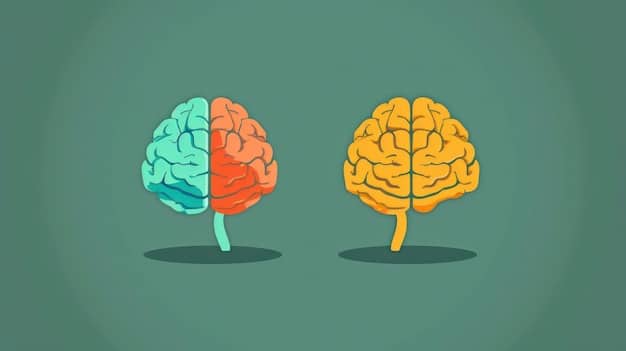Develop a Growth Mindset: Embrace Challenges & Learn

Developing a growth mindset involves believing that abilities and intelligence can be developed through dedication and hard work, fostering resilience, and embracing challenges as opportunities for growth.
Do you ever feel stuck in your abilities, like you can’t improve? The truth is, our brains are more adaptable than we think. Learning how to develop a growth mindset: how to embrace challenges and learn from setbacks is essential. It’s about believing in your potential to learn and grow, transforming obstacles into opportunities.
Understanding the Growth Mindset
The growth mindset is a belief that your basic qualities are things you can cultivate through your efforts or strategies. Individuals with a growth mindset believe that their talents and abilities can be developed through hard work, good strategies, and input from others. This contrasts sharply with a “fixed mindset,” where people believe their abilities are static.
The Core Beliefs of a Growth Mindset
At its core, a growth mindset is about believing that you can improve. Here’s a closer look at the key beliefs:
- Intelligence is Malleable: People with a growth mindset see intelligence and talent as starting points that can be developed.
- Effort Leads to Mastery: They understand that effort and persistence are essential for achieving mastery.
- Challenges are Opportunities: Challenges are viewed as opportunities to learn, grow, and improve.
Embracing these core beliefs isn’t always easy, but it’s the foundation for unlocking your potential and achieving more than you thought possible.
The Difference Between a Growth Mindset and a Fixed Mindset
The way we view our abilities has a profound impact on how we approach challenges, setbacks, and learning opportunities. Understanding the difference between a growth mindset and a fixed mindset is the first step in shifting towards a more empowering way of thinking.
Fixed Mindset Characteristics
Individuals with a fixed mindset tend to believe that intelligence and talent are fixed traits that cannot be changed. This belief system leads to several characteristics:
- Avoid Challenges: Because of fear of failure.
- Give Up Easily: Obstacles are seen as proof of a lack of ability.
- Ignore Feedback: Negative feedback is taken personally and seen as a reflection of their fixed abilities.

Adopting a growth mindset can transform your experience with learning, work, and relationships. It is about believing in your ability to grow and excel as a person.
Benefits of Cultivating a Growth Mindset
Developing a growth mindset can enhance your life, encouraging resilience, promoting continuous learning, and helping you unlock your full potential. The benefits extend to both personal and professional areas.
Enhanced Resilience
Those with a growth mindset are more resilient to setbacks. They bounce back faster and with greater determination, viewing failures as temporary rather than indicators of their fixed abilities this can affect personal and professional outcomes:
- View Failure as Learning: Learning from mistakes is seen as part of the growth process.
- Persist Through Difficulties: They are more likely to keep trying, even when things get tough.
- Maintain a Positive Attitude: They maintain a belief that they can improve.
In the long-term, those who develop these habits often reach levels exceeding those who believe their intelligence is fixed.
Practical Strategies to Develop a Growth Mindset
Transforming your mindset from fixed to growth isn’t an overnight process, it involves consistent effort and the application of practical strategies. By integrating these approaches into your daily life, you can foster a growth mindset that empowers you to learn, adapt, and thrive.

Embrace Challenges
Actively seek out opportunities that push you outside of your comfort zone. Embracing these challenges builds resilience and enhances your learning. You can do this by:
- Setting Ambitious Goals: Choose objectives that stretch your skills and require effort.
- Participating in New Activities: Engage in tasks that you’ve never done before or that you find intimidating.
- Volunteering for Difficult Projects: Take on assignments at work or in the community that you typically avoid.
By actively embracing challenges, you will begin to see obstacles not as blocks but as stepping stones.
The Role of Feedback in a Growth Mindset
Feedback is essential for growth. Developing a growth mindset requires more than just positive thinking – it requires the ability to accurately assess your current abilities and learn from experiences.
Seeking Constructive Criticism
Growth-oriented individuals actively seek constructive criticism to help improve. Remember:
- Ask for Specific Feedback: Request details about what you need to enhance to improve.
- Be Open to Others’ Opinions: Learn to accept advice and avoid defensiveness.
- Thank the Person: Show appreciation for their honesty and input.
Remember that feedback is meant to assist you improve; it’s not an attack on your character or intelligence.
Sustaining a Growth Mindset Over Time
Developing a growth mindset is an ongoing journey that requires persistence. Consistently reinforcing your new beliefs can help you overcome setbacks and continue your personal development. A lot of people succeed at understanding the concepts in theory but fail to practice them in everyday life.
| Key Point | Brief Description |
|---|---|
| 🧠 Understand Mindsets | Recognize the difference between fixed and growth mindsets. |
| 🛠️ Practical Strategies | Apply actionable techniques to cultivate growth in daily life. |
| 📝 Feedback’s Role | Use feedback effectively for learning and improvement. |
| 🌱 Sustaining Growth | Maintain mindset over time by setting new challenges. |
Frequently Asked Questions
▼
A growth mindset is the belief that your abilities and intelligence can be developed through dedication and hard work. It suggests that potential isn’t fixed, but can grow.
▼
Individuals with a fixed mindset believe that their abilities are static, while those with a growth mindset believe they can improve with effort and learning.
▼
Benefits include increased resilience, the ability to learn from failures, a greater motivation to pursue challenges, and higher overall achievement.
▼
Start by recognizing and challenging your fixed mindset beliefs. Embrace challenges, view effort as a path to mastery, and learn from feedback.
▼
Regularly set learning goals, reflect on your progress, and seek new opportunities to challenge your abilities. Stay committed to continuous self-improvement.
Conclusion
Adopting a growth mindset isn’t just about positive thinking; it’s about embracing a lifelong journey of learning and self-improvement. By believing in your potential to grow, you can unlock opportunities, overcome challenges, and achieve more than you ever thought possible. Start today, and watch as your world transforms.





